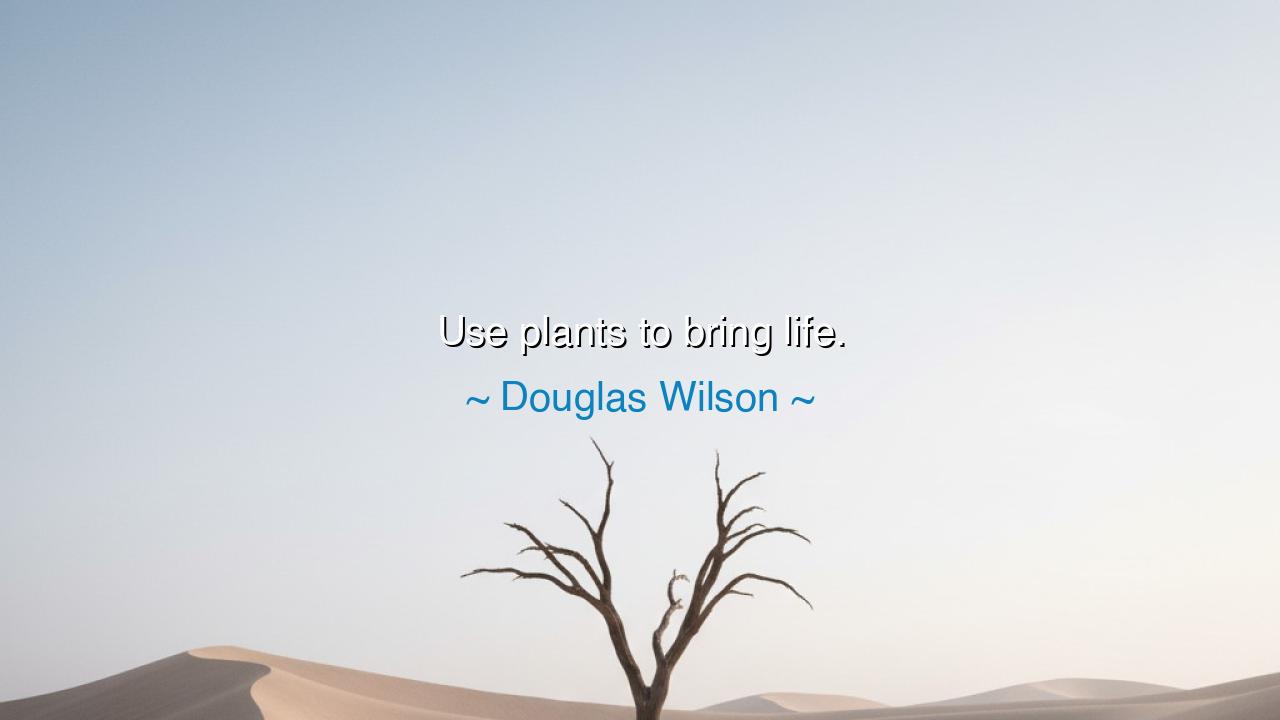
Use plants to bring life.






In the grand arc of existence, there is an undeniable truth—plants are not mere ornaments, but vessels of life itself. The words of Douglas Wilson, "Use plants to bring life," carry with them a wisdom that transcends time, reminding us that the act of planting is an act of creation and renewal. Plants—in their beauty, their sustenance, and their quiet endurance—carry within them the power to transform, to rejuvenate, and to breathe life into all that surrounds them. When we plant, we do not simply place a seed in the earth; we invoke the very forces of nature that sustain the cosmic rhythm, the heartbeat of the world.
The ancient Greeks, who worshipped the earth’s fertility through deities such as Demeter, the goddess of the harvest, understood this deeply. To them, plants were not just life-sustaining sources of food, but symbols of divine abundance. The planting of a seed was an act of sacred communion with nature—a means of participating in the eternal cycle of birth, growth, and rebirth. The farmer, as much as the philosopher, knew that to tend the land was to bring forth life in its most profound and transformative form. Every vine, every tree, every flower planted was a way to celebrate the divine presence in all things, to honor the gifts of the earth that sustain us.
Wilson’s words remind us that plants are far more than mere tools of survival; they are life-givers in the truest sense. Consider the ancient Egyptians, who relied on the annual flooding of the Nile to bring life to their crops. The river’s waters nourished the earth, turning the dry soil into fertile ground. Their very survival was tied to the power of nature—how the plants would spring forth after the floods and bring abundance to their people. For them, the act of planting was a sacred trust, an offering to the gods that they would care for the land, and in return, the land would offer them the fruits of life. This relationship between man and plant was not a mere exchange; it was a partnership in the creation of life itself.
To bring life through plants is not only about sustenance for the body but for the soul. The act of planting allows us to reconnect with the land and with nature’s rhythms. The ancient Chinese, too, understood the deep spiritual connection between humans and plants. The garden, in their philosophy, was not just a space for growing food or beauty; it was a place of tranquility and meditation, where the soul could align with the balance of nature. In the Daoist tradition, cultivating plants was seen as a way to harmonize with the universe, to find peace in the slow, patient unfolding of life. The plants were the living symbols of nature’s wisdom and the key to understanding the deep connection between all beings.
This timeless lesson carries into the modern world. Plants, in their simplicity, possess a power far beyond what we often recognize. A garden, whether humble or grand, is a place where life flourishes. The act of planting becomes a way of participating in the ongoing creation of the world, a statement that we, too, are part of the great cycle of existence. Think of Mahatma Gandhi, who spent years advocating for self-sufficiency and community gardens. His vision was rooted in the idea that by growing our own food, we do not just sustain ourselves, but we reconnect with the earth, fostering a deeper sense of unity with the world around us. Gandhi understood that in every seed planted, in every garden tended, there is an inherent renewal of spirit.
The wisdom of Douglas Wilson calls us to remember that every garden, every plant, has the power to bring life not only to the soil but to our hearts. When we care for the land, we care for ourselves; when we nourish the earth, we nourish our souls. This act of cultivation is not one of mere survival, but one of rejuvenation—an act that brings us closer to the earth, to nature, and to our deepest selves. It is a reminder that in tending to the land, we are part of something ancient, something sacred, and something that will continue long after we are gone.
So, let us heed this wisdom and act accordingly. Plant with purpose. Tend with care. When you plant, whether a garden of food or flowers, do so with the understanding that you are participating in a grand, eternal cycle of life. In every seed, in every flower, in every tree, there is the power to bring life—to the earth, to those around us, and to our own spirits. And in doing so, we not only nurture the world but allow the world to nurture us, filling our hearts with the same life-giving energy that we bring to the soil.






AAdministratorAdministrator
Welcome, honored guests. Please leave a comment, we will respond soon